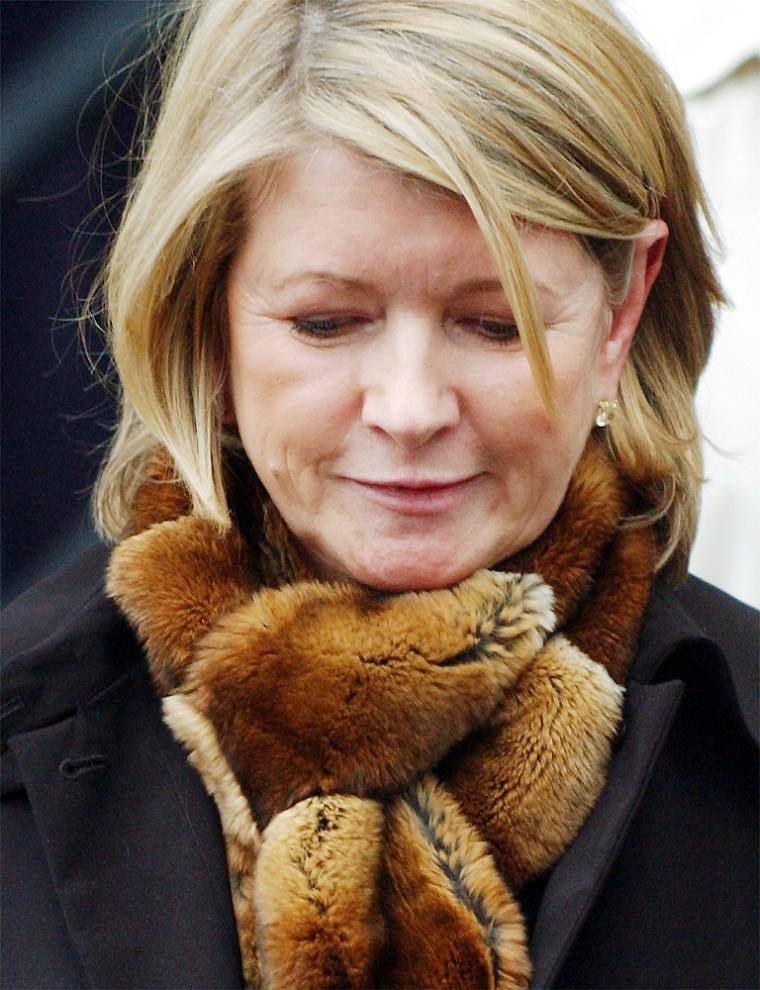Martha Stewart handed over her keys to the executive suite of the media empire she built Monday, a little more than a week after she was federal charges.
But she’s not cutting ties to the multimillion-dollar business that grew from a suburban Connecticut catering business.
Stewart stepped down from her board seat and gave up her chief creative officer title, but will still retain a creative role at Martha Stewart Living Omnimedia Inc., indicating that company officials believe they’ll be better off with her than without her.
The self-made queen of domestic arts — whose name has been stamped on magazines, TV shows and household products — will take the title of founding editorial director.
In that role, Stewart, 62, will continue to provide creative inspiration for new product design and development; pen two pending books, “Homekeeping” and “Baking”; and provide input on the continuing evolution of the company and its brand and strategic issues, the company said.
She will report to chief executive officer Sharon Patrick.
“Everyone at MSO recognizes the seriousness of Martha’s situation and is deeply saddened,” Patrick said in a statement. “However, all of us also believe that the company and our constituencies benefit most if we are able to continue to take advantage of Martha’s creative inspiration and capitalize on her prodigious skills and experience in the domestic arts.”
The logistics could be tricky, at least in the short term, as Stewart likely faces 10 to 16 months in prison when sentenced. Stewart has said she will appeal the March 5 conviction.
Company officials did not return requests for interviews.
In a statement, Stewart said Monday’s action was “in the best interest” of the company.
“I am heartsick about my personal legal situation — and deeply sorry for the pain and difficulties it has caused our employees,” she said. “I look forward to continuing to collaborate on a wide range of creative ideas with the amazing, talented and hardworking people at this very special company.”
Stewart, who is the company’s largest shareholder, had been expected to relinquish her board seat, but reportedly had been pressing to keep some creative non-officer role. Had she not stepped down, her departure from the board and any executive position would likely have been forced by the Securities and Exchange Commission, given that she is a convicted felon.
Stewart resigned as chairman and CEO last June, after she was indicted on charged related to her well-timed sale of stock in biotechnology company ImClone Systems Inc. in December 2001.
Monday’s shuffle — while it further diminishes Stewart’s role — shows that the company isn’t ready to sever its ties completely. Figuring out what role Stewart will play in the company’s future has been a tricky one, particularly in the wake of the conviction, which has tarnished the brand image.
Some believe the move to distance Stewart from the boardroom but retain her creative input is a smart one, placating both fans and deserters of Stewart. Others think a complete separation would have been best.
“I think they are walking a tightrope between her as an asset and her as a liability,” said Jamelah Leddy, an analyst at McAdams Wright Ragen.
But, she added, with Stewart owning 61 percent of the stock and a virtual lock on voting shares, she still will be extremely influential in the course the company takes.”
Seth Siegel, co-founder of The Beanstalk Group, a trademark licensing agency, said the compromise “allows them to say they stepped away from Martha, but still allows them to keep all options open. They can still further distance her, or renew their relationship.”
But Robert Passikoff, president of New York marketing research company Brand Keys Inc., said it was a bad strategy.
“They should have announced that Martha was going away for a while to deal with her problems,” he said, leaving the option of bringing her back in, say, two years. “It looks like she’s getting her cake and eating it too, and that’s not the way you rebuild trust among consumers.”
The question remains how involved Stewart can be, as she would be subject to a number of restrictions while in prison and will be required to work 35 to 40 hours per week at a menial prison job. Stewart is scheduled to be sentenced June 17.
Since Stewart’s name was tied to the ImClone trading scandal 22 months ago, her multimedia company has seen its stock plummet 40 percent; and suffered from declining sales; financial losses and a defection from its advertisers.
But sales of its merchandise, from furniture to housewares, have held up well.
The company began moving away from Stewart’s name a year ago with the launch of Everyday Food and is now testing another publication called Organizing Good Things. But it remains heavily tied to her aesthetic values and her image.
With its syndicated TV show on life support, the big issue that remains is what will happen to its flagship magazine, Martha Stewart Living, and whether the company will decide to change the name, eliminating any reference to its founder.
The company appears to be making some possible plans. On Jan. 23, three days after Stewart’s trial started, Martha Stewart Living Omnimedia applied to the U.S. Patent and Trademark Office to trademark “Everyday Living” for a magazine title.
